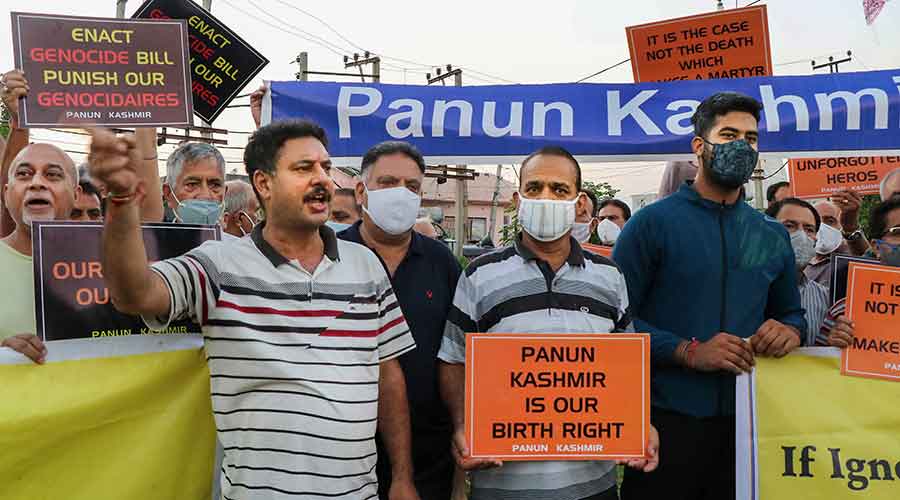A principal and a teacher, one a Sikh and another a Dogra, were killed by militants inside their school in a Srinagar locality, marking another bloody day in Jammu and Kashmir where rebels are increasingly targeting people of minority communities.
Officials said three militants stormed the Government Boys Higher Secondary School in Sangam locality in Srinagar’s Idgah area at 11.15am, apparently searching for non-Muslim teachers.
Eyewitnesses said they snatched the mobiles of the teachers but picked up two — principal Supinder Kour, 45, and teacher Deepak Chand, 39 — and shot them.
Kour was from Srinagar’s Aloochi Bagh locality and Chand was from Jammu.
The city has been rocked by six civilian killings in as many days, shattering the tall claims of the Narendra Modi government that the scrapping of state’s special status will end militancy in Kashmir.
Some Valley politicians linked the killings to the Centre’s 2019 decision to scrap Article 370, through which many here believe that New Delhi seeks to change the Muslim-majority character of the erstwhile state, which has ended up deepening the fissures between communities.
Fear has gripped the minority communities, with some apprehending a return to the deadly 1990s when thousands of Pandits and some Sikhs migrated to other parts of the country.
In Delhi, Union home minister Amit Shah chaired a high-level meeting with national security adviser Ajit Doval, home secretary Ajay Bhalla and Intelligence Bureau chief Arvind Kumar to discuss the unfolding situation.
The killings, it is feared, will deal a further blow to the Centre’s long cherished goal of facilitating the return of migrant Kashmiri Pandits to the Valley.
Of the five men and a woman who fell to militants here during the past six days, four — Makhan Lal Bindroo, a prominent Kashmiri Pandit businessman, Virendra Paswan, a street vendor from Bihar, Kour and Chand — were members of minority communities.
The families of the victims were devastated by their deaths with videos showing them crying inconsolably.
“Why did you kill her? Why didn’t you kill me? What had she done?” asked the wailing mother of Kour.
Mohit Bhan, a Kashmiri Pandit who is the spokesperson of the PDP and lives in the Valley, said the killings have triggered a deep sense of insecurity among the minority communities.
“Received frantic calls , fear in the voice sent shivers down my spine. Go out stand with them they need you more than ever today. The callousness of administration for pushing us back to 90s can’t be ignored,” Bhan tweeted.
Director-general of police Dilbagh Singh said the killings have been executed to create an atmosphere of fear and disturb harmony in Kashmir by giving a communal colour to the situation.
“We are grieved that such incidents have taken place one after another. People have lost lives. We are working on cases which happened earlier. Srinagar police have got a lot of clues and soon terrorists involved in this barbarity, targeting values and communal harmony, will be exposed,” Singh told reporters.
The DGP said it was an attempt to malign Kashmiri Muslims.
“Those who come from outside to earn a living are targeted and there is a conspiracy to prove there is no love lost. Terrorists are terrorists and are doing it at the behest of agencies from across (the border),” he said.
Though the killings have been widely mourned in Kashmir, some politicians claimed they were a fallout of the decision to scrap its special status.
“When Article 370 was abrogated, a group of usual low IQ, high decibel RW (Right-wing) social media influencers went overboard to argue for forced demographic change, without realising what the repercussions of this alarm. The blood is on their hands as well,” tweeted National Conference spokesperson Ifra Jan.
Jan deleted the tweet after Kashmiri Pandit Twitter users accused her of defending the gruesome killings.
In January, Satpal Nischal, a 70-year-old Punjabi jewellery shopowner in Srinagar’s Saraibala, was shot dead by militants. A month later, militants killed Aakash Mehra, son of the owner of Krishna Dhaba at Sonwar here.











